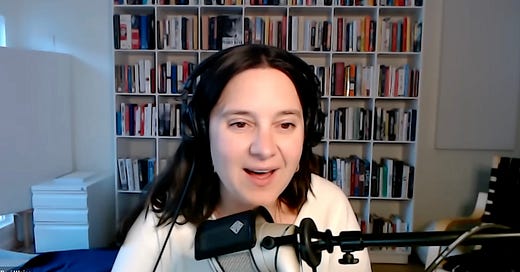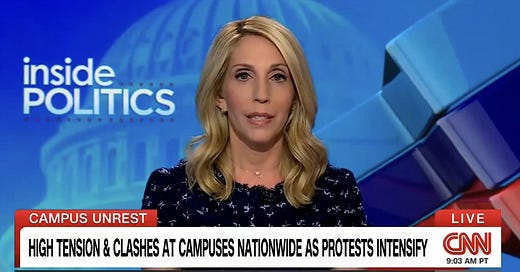
AI Won't Kill Us But It Will Take Our Souls
A small group of short-sighted fools are determined to stamp out what makes life beautiful.
I am not a particularly religious person. Institutions and doctrines frighten me; I’ve seen more than enough fucked up shit produced by dogma to ever subscribe to a particular creed.
To the extent that I believe in something intangible that is separate from the mundane and messy corporeal world we inhabit, I think that “god” can be found in the deliberate creation of beauty and art that human beings are capable of. I do not know what gives us consciousness, but I can imagine that our species’ unique way of perceiving the world comes from some tangential connection to a power separate from our flesh. I guess what I’m saying is that I’ve never seen a dog write a book and that makes me feel pretty special.
Still, part of that higher level of thinking means that we humans have long had a fascination with replicating ourselves. We can see and perceive the gift that we have been given and it is only natural that we now seek to give it ourselves. This, I think, is at the heart of the push behind creating “artificial intelligence”—we want to see if we can recreate the divine circumstance that gives us a soul. And yet, somewhere along the way, a darker and more base instinct has come to rule the field of AI: the desire to dominate and control, to create only things that will serve us, and in the worst case, give us advantages over other members of our own kind.
All of this is a very flowery way to say that a bunch of fucking assholes are creating technology that could steal our jobs.
I’ve been thinking about this a lot in the past couple of days, ever since reading our friends over at 404 Media’s great post about AI content scrapers that are ripping off journalists’ original work and recycling it for hundreds of SEO-optimized chum blogs, perverting the things written by living human beings into an uncanny valley simulacrum of language that does a disservice to any person unlucky enough to read it.
The reason these bots exist is very simple: they make the people who created them money. I hate those people—and, if I’m being honest, the vast majority of the AI industry—with a passion that I cannot quite articulate, at least without placing this website at risk of some potentially serious legal consequences.
This hatred doesn’t really come from a place of personal fear. AI, in its current form, cannot even competently drive a car. My job, which is primarily to go out into the world and talk to other human beings and then write down and describe what they’re doing and thinking, cannot be done by anything other than a human being. A robot is not going to take that job. It is distressing, though, that some of the more rote versions of professional writing—summarizing and researching, namely—are being emulated by new models like the ones described in 404’s post.
I’m not desperate to defend the field of content or copywriting, to be clear, but it’s patently obvious that the product that these algorithms produce is—currently—vastly inferior to what an actual human being can create. Even if ChatGPT eventually absorbs enough prose to write coherently and not sound like a toddler coming out of general anesthesia, the fact that these algorithms cannot think critically about the information they’re chewing up and spitting out means that everyone trying to replace actual writers with bots is a moron at best and a monster at worst. The execs “playing” with AI in newsrooms or “experimenting” with it aren’t trying to enhance their publication’s journalism. They’re just trying to cut costs by doing a more tortured version of what the shady blog-scraper bots are doing: flooding the zone with garbage in the hopes that they can wring a few more cents out of the larger tech companies that control advertising revenue.
This is just one particularly repulsive aspect of “AI.” But when you look at the industry as a whole, the trend continues. Every AI startup on the market right now wants to make it sound as though its efforts will somehow improve the world we live in. The smartest minds in the industry, I would think, must know that this is a lie—that the technology as it is currently applied exists, like any other product, to make money for its creators above all others. Those minds, I’m sure, also know that it does not have to be this way—that there are surely ways to pursue artificial intelligence that do not seek to replace human consciousness with soulless avatars of efficiency and commerce.
And this, I think, is where the true danger of AI comes in. Contrary to many drug-addled morons making predictions, I don’t think some artificial intelligence singularity will wipe human life off the face of the earth (though you can’t say we wouldn’t deserve it). What it might do, though, is allow a small cadre of shortsighted fools and cut-throat monsters to kill god—to strip away and pervert human creativity with an endless flood of half-recognizable imitations of art that drown out real peoples’ actual attempts to connect with one another through words or images or sound.
Already, meme pages are filled with weird-looking images created by Midjourney or other disgusting programs, Twitter is awash with obnoxious ChatGPT prompts, and TikTok is filled with voice-dubbed clips of Donald Trump and Barack Obama playing Fortnite. I hate it. I hate it all. They make me feel sick to look at and to think about. Sure, it’s not as if memes—which by definition are a form of iterative repetition of the same jokes and information—are a particularly storied art form. But the best of them, like any viral internet content, are often expressions of human creativity, which is fundamentally diluted when the only thing needed to make them is half an idea fed through a text box that spits out “art.”
These are small examples. There are enormous swathes of the AI industry that are not devoted to creating worse art than the horrible graffiti covering all the legal weed shops in New York City. These companies often do not advertise a product that has anything to do with art, instead promising to automate tasks or help people work more efficiently in non-creative fields. In theory, I have no problem with this. I’m not fully sold on some idea of degrowth—that we should abandon all attempts to make life easier as a whole. But I worry that again, the impetus behind these efforts in AI is not to increase the quality of life for living people but to widen the profit margins for the corporations that use them. I have no problem with the robots learning to flip burgers, but only if the surplus wealth created by that artificial labor is used to provide a better future and more options for those people who would otherwise have worked the grills. This is not, it’s fair to say, the world that we live in.
What really scares me is that, as far as I can tell, no one in a position of power over how we use AI cares about this. They do not care that there must—for the sake of all our souls—be parts of the human experience that are off-limits to AI. Instead, they’re consumed only by the desire to maximize their control over both the natural and artificial worlds, in service of hoarding wealth and bending those with less than them to their will. If god is the intangible spark that allows us to create beauty, the AI industry only serves its opposite. Its creations, then, are those of the devil. We owe it to ourselves to turn away from—or destroy— them at every chance we get.

















YES. I’ve never really bought the “technology is neutral” argument. It is always determined and constrained by its context, and when that context is capitalism…well, here we are.
The only good thing that AI has given us is the Biden VS Trump Twitch channel. It's gloriously dumb and brilliant.